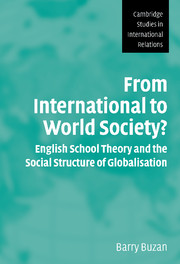 From International to World Society?
From International to World Society? Published online by Cambridge University Press: 14 January 2010
The most fundamental question you can ask in international theory is, What is international society?
Wight (1987: 222)After a long period of neglect, the social (or societal) dimension of the international system is being brought back into fashion within International Relations (IR) by the upsurge of interest in constructivism. For adherents of the English school, this dimension was never out of fashion, with the consequence that English school thinking itself has been somewhat on the margins of the discipline. In this book I will argue that English school theory has a lot to offer those interested in developing societal understandings of international systems, albeit itself being in need of substantial redevelopment.
International society is the flagship idea of the English school. It carves out a clearly bounded subject focused on the elements of society that states form among themselves. This domain has been quite extensively developed conceptually, and considerable work has also been done on the histories of international societies, particularly the creation of the modern international society in Europe and its expansion to the rest of the planet. World society also has a key place in English school theory, but is much less well worked out. While international society is focused on states, world society implies something that reaches well beyond the state towards more cosmopolitan images of how humankind is, or should be, organised. Quite what that ‘something’ that defines world society is, however, remains at best contested, and at worst simply unclear.
To save this book to your Kindle, first ensure [email protected] is added to your Approved Personal Document E-mail List under your Personal Document Settings on the Manage Your Content and Devices page of your Amazon account. Then enter the ‘name’ part of your Kindle email address below. Find out more about saving to your Kindle.
Note you can select to save to either the @free.kindle.com or @kindle.com variations. ‘@free.kindle.com’ emails are free but can only be saved to your device when it is connected to wi-fi. ‘@kindle.com’ emails can be delivered even when you are not connected to wi-fi, but note that service fees apply.
Find out more about the Kindle Personal Document Service.
To save content items to your account, please confirm that you agree to abide by our usage policies. If this is the first time you use this feature, you will be asked to authorise Cambridge Core to connect with your account. Find out more about saving content to Dropbox.
To save content items to your account, please confirm that you agree to abide by our usage policies. If this is the first time you use this feature, you will be asked to authorise Cambridge Core to connect with your account. Find out more about saving content to Google Drive.